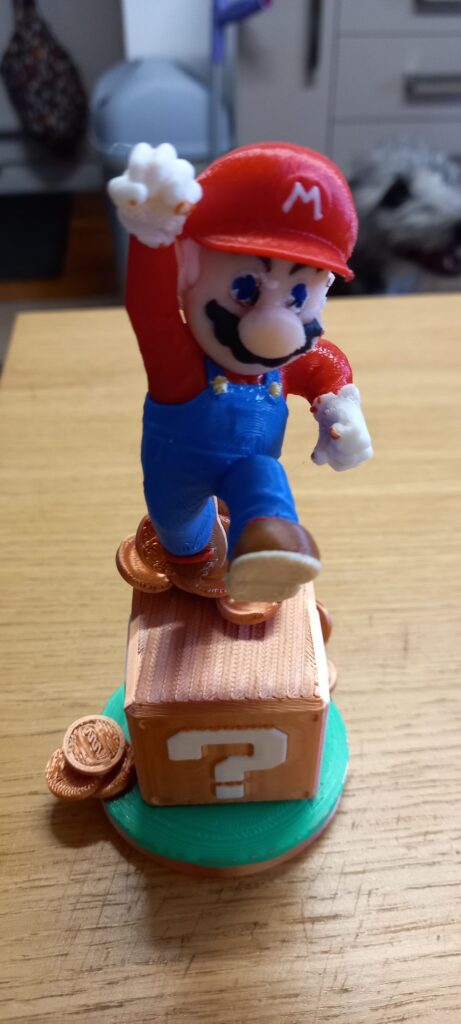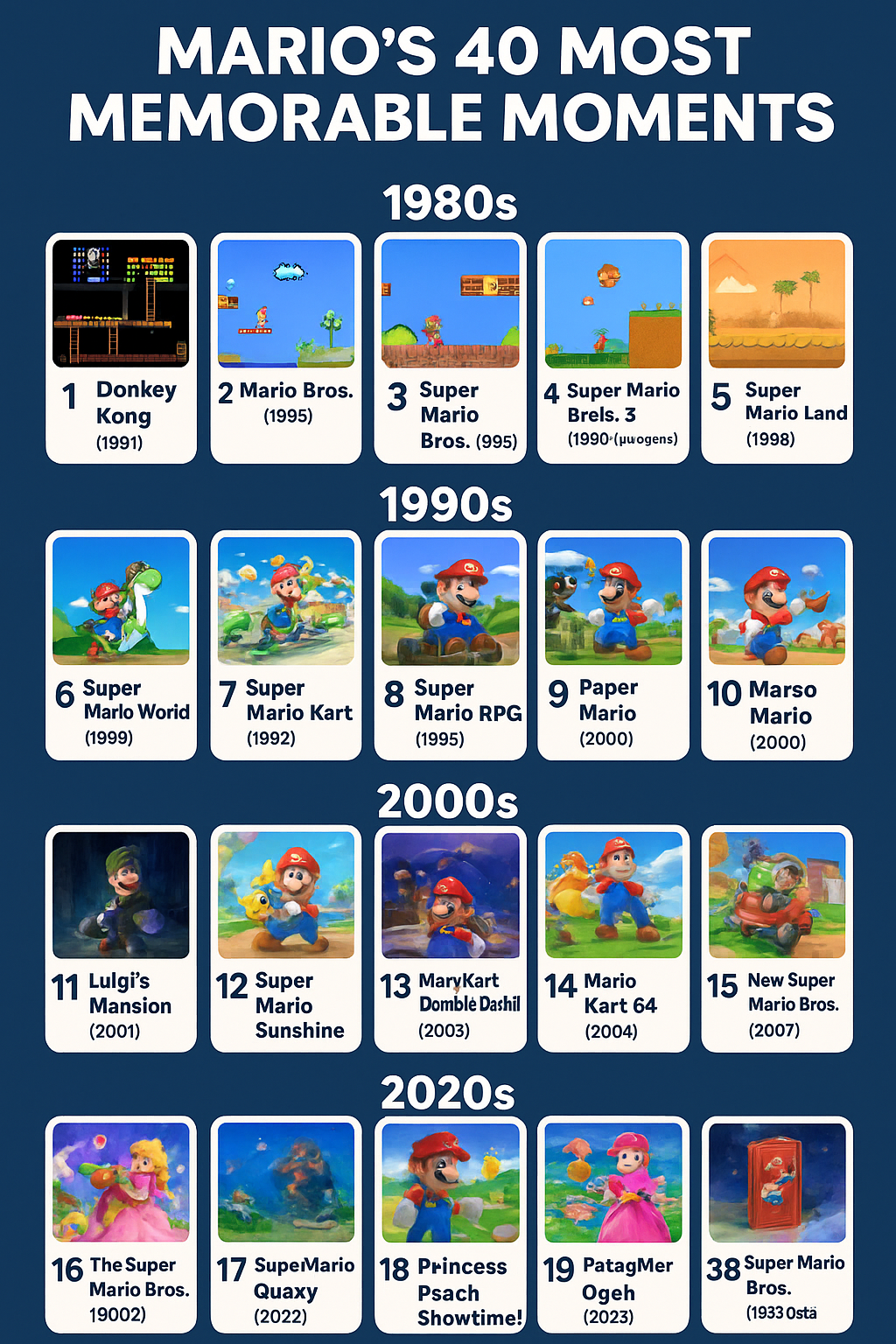40 Years of Mario: A Journey Through a Legend
When one thinks of video game icons, few shine as brightly as Mario. The mustachioed plumber from the Mushroom Kingdom has, over four decades, become more than just a character in games—he’s a global symbol of fun, creativity, and gaming culture.
Origins: Where It All Began
- Mario first appeared in Donkey Kong (1981) under the name “Jumpman.” Mario was a relatively simple character then, but already showing the hallmarks that would define him: daring, resilient, and heroic from his very first appearance. https://www.kswo.com+2Wikipedia+2
- Shortly after, in Mario Bros. (1983), he was officially named “Mario,” and Luigi was introduced as his brother. This laid the foundation of their relationship and many adventures to come. Wikipedia+1
The Birth of Super Mario
- The milestone most people point to when celebrating “Mario’s 40th birthday” is Super Mario Bros., released on September 13, 1985. That game transformed platformers, introducing smooth side-scrolling, inventive power-ups (like the Super Mushroom and Fire Flower), and a whole world to journey through. Cubed3+3Mario Wiki+3greenmangaming.com+3
- Therefore, the 40th anniversary being celebrated in 2025 is really the 40th anniversary of Super Mario Bros. rather than Mario’s very first appearance. Mario Wiki+2Reddit+2
Mario as a Character & Persona

- Physically, Mario is a plumber from Brooklyn, with blue overalls, white gloves, a red hat (with an “M”), brown shoes. He lives in the Mushroom Kingdom alongside his brother Luigi. Wikipedia
- Nintendo has stated that Mario’s age is about 24–25 years old in terms of character age—not the years since his creation. Wikipedia
- His birthday, as per Nintendo Power, is October 11, though in the fan community there is often debate around exact dates (also influenced by “Mario Day” on March 10). Reddit+3Wikipedia+3GameRant+3
Evolution of the Mario Franchise
Over 40 years, Mario hasn’t stood still. Here’s a rough sketch of how his games have evolved:
| Era | Key Titles / Innovations |
|---|---|
| 1980s | Donkey Kong, Mario Bros., Super Mario Bros., Super Mario Bros: The Lost Levels, Super Mario Bros. 3 – establishing the basics: power-ups, varying level design, challenge curve. Nintendo Life+1 |
| Early ’90s | Handheld adventures (Super Mario Land), Super Mario World with Yoshi, and refining design and breadth of Mario’s world. Nintendo Life+1 |
| 1996 and beyond | The leap into 3D with Super Mario 64, which changed what platforming could be. Portable and hybrid innovations with 3D Land, 3D World, etc. Galaxy-era experiments, open-world elements in Odyssey. Cubed3+2Nintendo Life+2 |
| Recent years | Fresh takes in style and gameplay: Super Mario Bros. Wonder, ports and remasters (e.g. Galaxy games), new spin-offs, and multimedia expansions. Nintendo Life+3Mario Wiki+3The Times of India+3 |
The 40th Anniversary Celebrations (2025)
2025 marks the 40th anniversary of Super Mario Bros. and with it, Nintendo and the wider Mario community have lined up several festivities and announcements:

- A timeline highlighting every major Super Mario Bros. game, from the original NES title through to Wonder on the Switch. Nintendo Life
- Release plans for remastered Galaxy games (Super Mario Galaxy & Galaxy 2) with upgraded visuals. The Times of India+2TechRadar+2
- New titles are in the works: Mario Tennis Fever (Feb 2026) and Yoshi and the Mysterious Book in Spring 2026. TechRadar
- Merchandise, books, special events (e.g. meet-and-greets), and more cultural celebrations. A new book “Super Mario Collection 40th Anniversary” is set to chronicle his history with collectibles. Nintendojo
Why Mario Matters
Mario’s staying power comes from a few key ingredients:
- Innovation: Each generation, Mario games push boundaries—whether it’s hardware use, game mechanics, or storytelling.
- Accessibility: Mario games tend to be welcoming to new players while still offering depth and challenge for seasoned gamers.
- Consistency & Charm: The characters, world design, music—there’s a consistent aesthetic and spirit that resonates.
- Cultural Impact: Beyond games: cartoons, movies, merch, theme parks; Mario is more than pixels and code.
Reflection: What 40 Years Teach Us
- Super Mario Bros. is not just a game; it’s a benchmark. When it was released in 1985, it helped define what platformers should be. To celebrate 40 years is to appreciate that impact.
- Over four decades, video games as a medium have changed dramatically—graphics, hardware, platforms, distribution—but Mario remains relevant, a kind of anchor point for the medium’s history.
- Anniversaries like this are as much about nostalgia as they are about looking forward: what new things will Mario do? Where will his adventures take us next?
Looking Ahead
Considering how Mario has evolved, there are exciting possibilities:
- More remasters, possibly reimaginings of classic levels
- New stories in new settings, possibly deeper narrative layers
- Expanding the universe beyond games—movies, immersive experiences
- Integration of newer tech (VR, AR, cloud gaming, etc.)
Conclusion
As Mario turns 40 (at least in Super Mario Bros. years), the world pauses to celebrate not just the character, but a whole lineage of design, art, and joy. It’s rare for a character to be at once a child’s first game, a lifelong fan’s favourite, and also a benchmark in interactive storytelling. Mario embodies all that, and his 40th birthday is a chance both to look back with fondness—and ahead with anticipation.

